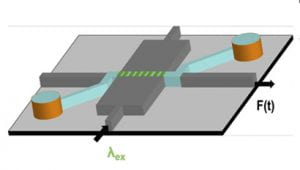
This illustration shows the setup of the optofluidic chip for rapid detection of single antigens of SARS-CoV-2 and Influenza A. (Image credit: Stambaugh et al., PNAS 2021)

This illustration shows the setup of the optofluidic chip for rapid detection of single antigens of SARS-CoV-2 and Influenza A. (Image credit: Stambaugh et al., PNAS 2021)
Ultrasensitive antigen test detects SARS-CoV-2 and influenza viruses
Novel chip-based diagnostic technology can detect individual viral antigens in nasal swab samples to identify the viruses that cause COVID-19 and flu with a single test
May 11, 2021 | Tim Stephens | UCSC
Researchers at UC Santa Cruz have developed a novel chip-based antigen test that can provide ultrasensitive detection of SARS-CoV-2 and influenza A, the viruses that cause COVID-19 and flu, respectively.
The test is sensitive enough to detect and identify individual viral antigens one by one in nasal swab samples. This ultrasensitive technique could eventually be developed as a molecular diagnostic tool for point-of-care use. The researchers reported their findings in a paper published May 4 in Proceedings of the National Academy of Sciences.
“This is a chip-based biosensor capable of detecting individual proteins one at a time, and we show how it can be used to detect and identify the antigens for multiple diseases at the same time,” said senior author Holger Schmidt, professor of electrical and computer engineering at UC Santa Cruz.
“It’s a whole new way of looking for molecular biomarkers, not only for infectious diseases, but for any protein biomarkers used in medical testing,” added Schmidt, who holds the Kapany Chair in Optoelectronics and directs the W. M. Keck Center for Nanoscale Optofluidics at UCSC’s Baskin School of Engineering.
The current gold standard for diagnosing SARS-CoV-2 infections uses PCR technology to amplify small amounts of the virus’s genomic material, and samples are analyzed in centralized laboratories such as UCSC’s Colligan Clinical Diagnostic Laboratory. Antigen tests, which detect viral proteins, are faster and easier to use and have been approved for testing at the point of care (e.g., doctor’s offices) and even for at-home use, but these tests are not considered accurate enough for clinical decision-making, and their results may require confirmation with a more reliable technique.
Read more in “Utrasensitive antigen test detects SARS-CoV-2 and influenza viruses.”
